

Moodle. Moodle. Moodle. ‘Take the child on from where they are now’ has long been a slogan in early childhood, but I wonder, as educators, if we always do it?
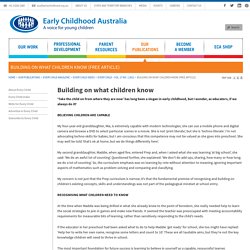
Moodle. Moodle. The EYFS Profile summarises and describes children’s attainment at the end of the EYFS.
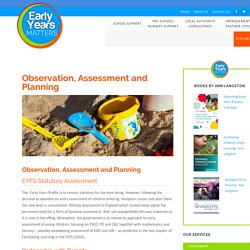
It is based on on-going observation and assessment in the three prime and four specific areas of learning, and the three learning characteristics, set out below: The prime areas of learning: Moodle. Moodle. Pre-birth to Three: Observation, Assessment and Planning.
LearnEnglish Parents - British Council - 896 Photos - Education - 10 Spring Gardens, SW1A 2BN London, United Kingdom. This ‘Kindness Curriculum’ Is Free And Should Be Used In Every Classroom. Imagine living in a world that valued kindness enough to teach it along with academics. Educators would teach kids to manage their emotions in addition to standard curriculum such as math and science.
Sounds pretty amazing, doesn’t it? Well, the Center for Healthy Minds at the University of Wisconsin-Madison has created a free “kindness curriculum” for kids, designed to do just that. It’s a mindfulness-based curriculum for preschoolers that will bring kindness into the classroom. “Faced with mental and physical health challenges at a global scale, we conduct rigorous scientific research to bring new insights and tools aimed at improving the wellbeing of people of all backgrounds and ages,” states the Center’s mission statement.
21 of the Best Early Years Books for International Friendship Day. We know that skills like empathy aren’t fully developed until later in a child’s life, which is why there are so many stories on friendship and how to treat people aimed at Early Years. International Friendship Day, then, is a great opportunity to share some of these amazing books with your children. It does, however, fall on Sunday 30 July. So celebrating on the day itself is going to be difficult, doubly so for Reception classes who are on summer holidays. Here are our picks for some top tales that touch on various aspects of friendship that kids will love. 1 | Bubble Trouble Tom Percival (Bloomsbury, paperback, £6.99) The Key to Effective Classroom Management.
It’s a daunting but all-too-common sight for many teachers: A classroom full of rowdy students who are unable to focus on the lesson. Classroom management techniques may get things back on track, but valuable time has already been lost. Many experienced teachers know that making meaningful connections with students is one of the most effective ways to prevent disruptions in the first place, and a new study set out to assess this approach. A 19-Year Study Reveals Kindergarten Students With These 2 Skills Are Twice as Likely to Obtain a College Degree (and They Have Nothing to Do With Reading)
One theory all teachers with disruptive children should know about. Imagine a classroom where children are unable to wait their turn or stay focused on their work.
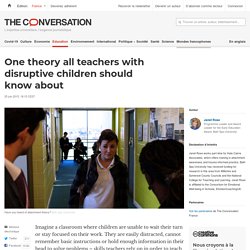
They are easily distracted, cannot remember basic instructions or hold enough information in their head to solve problems – skills teachers rely on in order to teach successfully. These behavioural issues are all examples of problems that can arise from attachment issues – based on the relationship between children and their main caregiver. Attachment theory is now one of the world’s most well-researched theories about human development. It was first proposed by the 20th-century British psychiatrist John Bowlby, who considered that children needed to develop a secure attachment with their main caregiver via sufficiently consistent, responsive, sensitive, appropriate and predictable care and support.
Don't Expect Toddlers To Behave Consistently — They Literally Can't. One day, when my oldest daughter was not quite 2, she wouldn’t sit still to let me change her diaper. Squirrelly and writhing, she made a game out of staying half naked. She wasn’t fussing about it or anything — in fact, she was giggling maniacally. The problem was that we were running late. Nothing I did seemed to faze her. I tried distracting her with a toy. Can Free Play Prevent Depression and Anxiety In Kids? KQED Public Media for Northern CA. Babies and toddlers raised in supportive and caring home environments tended to do better on standardized tests later on, and they were more likely to attain higher degrees as adults.
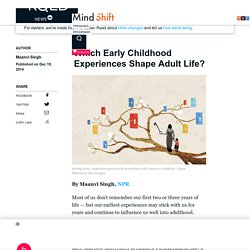
They were also more likely to get along with their peers and feel satisfied in their romantic relationships. "It seems like, at least in these early years, the parents' role is to communicate with the child and let them know, 'I'm here for you when you're upset, when you need me. And when you don't need me, I'm your cheerleader,' " says Lee Raby, a psychologist and postdoctoral researcher at the University of Delaware who led the study. Raby used data collected from 243 people who participated in the Minnesota Longitudinal Study of Risk. All the participants were followed from birth until they turned 32. Of course, parental behavior in the early years is just one of many influences, and it's not necessarily causing the benefits seen in the study. KQED Public Media for Northern CA. To make that argument requires a deep dive into the profound nature of empathy.
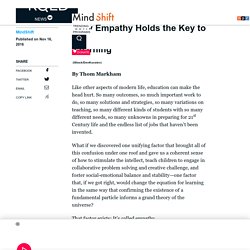
Right now, empathy roughly equates to “I like you and am willing to tolerate you regardless of differences because I am a good person.” But the textbook definition hints at something more profound: It’s ‘the feeling of being able to understand and share another person’s experiences and emotions.’ That all-encompassing definition means empathy results from a complex mix of other meaningful emotions and attitudes that fuel human personality, such as openness, curiosity, self-restraint, vulnerability, sensitivity, awareness, respect, appreciation, and even love. HowLearningHappens. Moodle. Moodle. Moodle. Moodle. Key Person & Attachment - Early Years Matters. The Key Person Children thrive from a base of loving and secure relationships. This is normally provided by a child’s parents but it can also be provided by a key person. How Are Happiness and Learning Connected?
As teachers, we also know that when students' affective filters or defenses are sky high, fight or flight responses will be modus operandi. A room full of defensive behaviors (withdrawn, angry) is a sad, unproductive place to teach and learn. Now let's flip it and take a look at how much more we are able to learn when we are in harmony with the people and things in any given educational environment. Being in harmony means feeling safe, feeling valued and a necessary part a group, and in this case, a learning community. Hearts and Minds in Sync What does research show to be the opposite of the brain's fight or flight response? Moodle. Moodle. I often get asked about children’s behaviour.
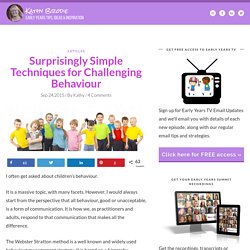
It is a massive topic, with many facets. However, I would always start from the perspective that all behaviour, good or unacceptable, is a form of communication. It is how we, as practitioners and adults, respond to that communication that makes all the difference. The Webster Stratton method is a well known and widely used behaviour management strategy. It is based on a hierarchy pyramid, with Play at the foundation, moving up through Praise, Limit setting, Ignoring and using Time out as a final resort. Moodle. A: It is perfectly normal for toddlers to not sit still very long—period.
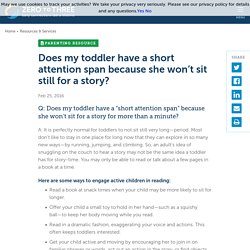
Most don’t like to stay in one place for long now that they can explore in so many new ways—by running, jumping, and climbing. So, an adult’s idea of snuggling on the couch to hear a story may not be the same idea a toddler has for story-time. Whole Child Development Is Undervalued. The question is how to make such an approach both systemic and sustainable. Moodle. Moodle. Moodle. Inside: Music and movement is a wonderful way to work on physical skills, while also encouraging young children to learn sounds, words and patterns.
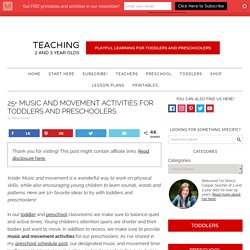
Here are 10+ favorite ideas to try with toddlers and preschoolers! In our toddler and preschool classrooms we make sure to balance quiet and active times. Young children’s attention spans are shorter and their bodies just want to move. In addition to recess, we make sure to provide music and movement activities for our preschoolers. As I’ve shared in my preschool schedule post, our designated music and movement time is after snack. The good thing about music and movement activities? Psst … I’ve created a cover for your music binder! Music is an important part of our toddler and preschool curriculum.
Moodle. Moodle. Moodle. Moodle. What makes illustrated storybooks such a good resource for teaching young learners of English?
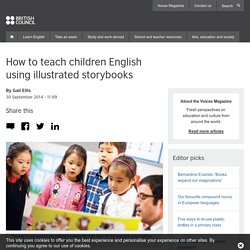
The British Council’s Gail Ellis, co-author of a storytelling handbook for primary English language teachers, explains. Moodle. Moodle. Moodle. Moodle. The Art of Control. How to help your child learn English with YouTube videos. Tracey Chapelton, education consultant and materials writer, has some advice for parents of young English learners, whose home language might not be English. Practical tips. By Opal Dunn, educational consultant and author Introduction.
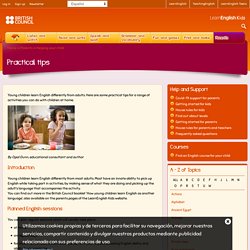
Moodle. Moodle. Does multilingualism cause language delays and identity problems? The British Council's Nayr Ibrahim busts a few more myths about speakers of multiple languages. Myth: Multilingualism causes language delay Raising children bilingually is sometimes believed to cause language delay. Moodle. Language teacher and researcher Miguel Angel Muñoz explains the latest research on how being bilingual affects your brain, ahead of a British Council seminar in Cardiff on whether learning a foreign language makes you smarter. Map 2nd course. Moodle. Moodle. Play is a serious business. The pioneering developmental psychologist Lev Vygotsky thought that, in the preschool years, play is the leading source of development. Moodle. As an early years practitioner you will know the importance of creating the right balance between adult-led and child-initiated learning.
Moodle. Community Playthings. Heuristic play is rooted in young children’s natural curiosity. Week 2. Week 1. KQED Public Media for Northern CA. Patricia Kuhl: The linguistic genius of babies. Alison Gopnik: What do babies think? How young children learn English as another language. The Power of Evening Routines. How do you speak 'Motherese'? The Woman Who Changed Her Brain: Barbara Arrowsmith-Young at TEDxToronto.
How baby brains develop. Early childhood development – it’s not rocket science, it’s neuroscience! - Kathy Brodie Early Years Training. Being Multilingual: You speak with an accent. I don’t. FAQ: Raising Bilingual Children. Deb Roy: The birth of a word. Listen to Your Mother. Let's Talk.
Why does my toddler love repetition? How can I help my child to start talking? (Video) Multilingual Preschoolers.